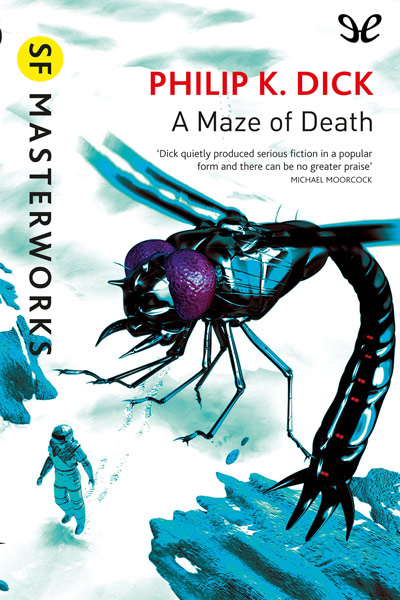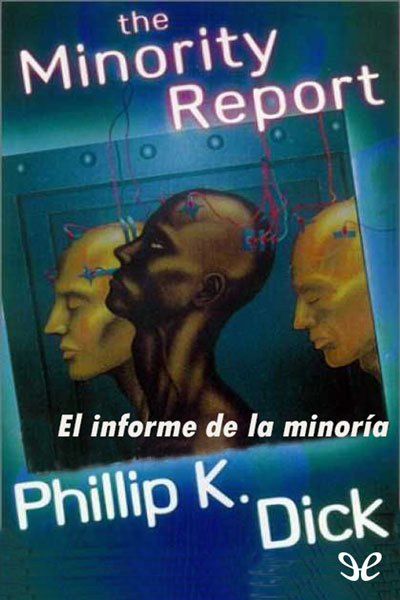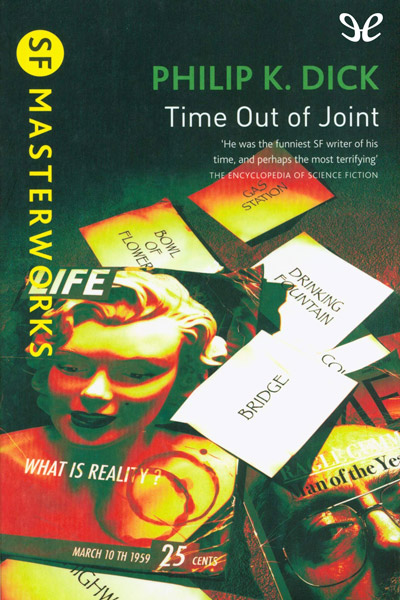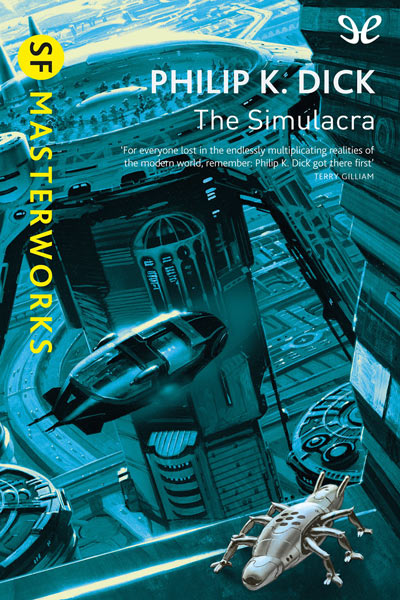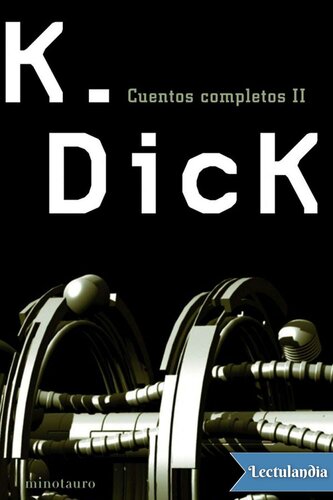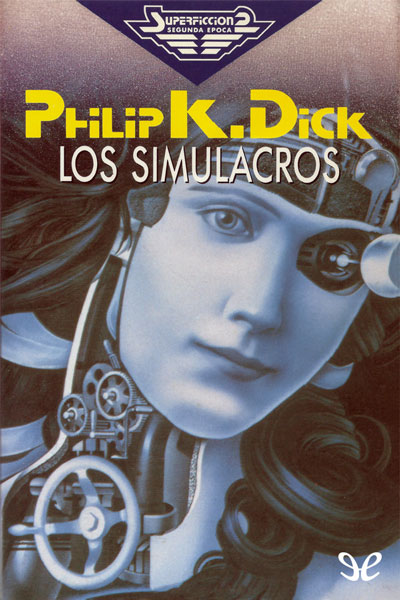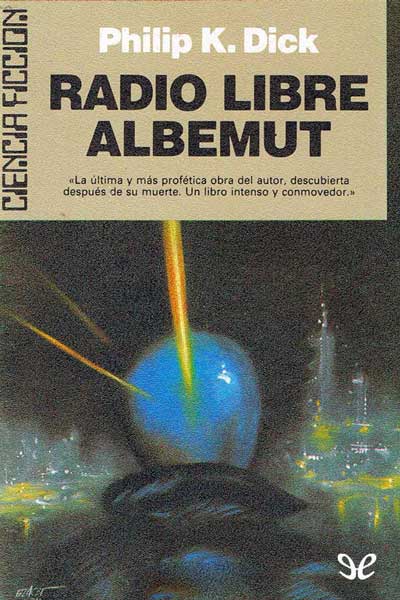oleebook.com
Els androides somien xais elèctrics? de Philip K. Dick
de Philip K. Dick - Género: Ciencia ficción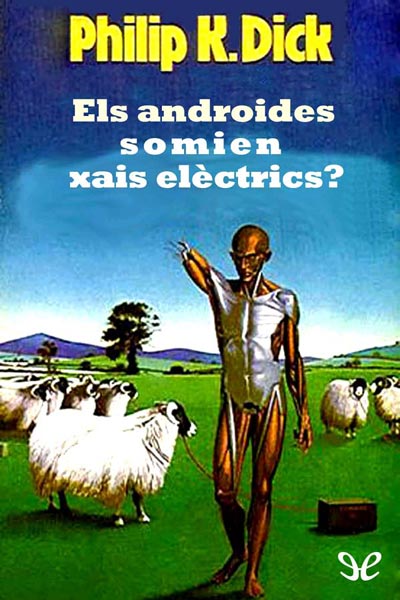
Sinopsis
En un món arrasat per la guerra i ple de desferres tècniques i blocs de pisos en procés de desintegració, Rick Deckard es guanya la vida com a caçador mercenari amb la missió de retirar els androides rebels.
Aquesta novel·la fou la base del guió de la pel·lícula de Ridley Scott, Blade Runner, i planteja simbòlicament el conflicte de lhome amb la màquina.
Libros Recomendados - Relacionados
Reseñas Varias sobre este libro
I could say that I love Dick, but that would be weird. I do very much enjoy Philip K. Dick's writing and though this is not one of his best, the "Pizza and Sex Rule" applies to him; ie. just as even bad pizza and / or sex is still pretty good, bad PKD is as well. And this is not bad at all.
The first mistake that a new reader would make is to watch Blade Runner and expect a novelization of that film; it was LOOSELY based upon the book. I'm a big fan of the Ridley Scott film starring Harrison Ford and Rutger Hauer, but the movie diverged from Phillip K. Dick's literature early on. The book is far more bleak than the film, if you can believe that, and much more intricate and complicated. Blade Runner benefits from a simplified storyline.
The author was far ahead of his time both in the complexity of his story and the perspective from which he writes. There are elements of Brave New World, I, Robot, and Dune; but the author has a unique voice and the story is an original. It is not an excellent work, as there are gaps and inconsistencies and many loose ends that are never tied in, but the concept and provocation are superb.
One element of the book that was completely left out of the film was a sub-plot involving a Christ- messiah and a faith system based upon what could have been a hoax. First published in 1968, this was one of his more theological based novels, and a trend that would continue steadily becoming more frequent and invasive until the end of his writing.
A MUST read for PKD fans as well as SF/F fans period.
*** 2020 Reread:
One thing I love about PKD writing is the accessibility. He discusses complex, sophisticated issues, but he never is. Theres a blue-collar element to him that is ubiquitous across his canon. He grew up working low level retail and repair shop jobs and it never left him.
Another element of this book that I picked up on more this time was the empathy religion set up around Wilbur Mercer. When I read this before, I thought of it as kind of a weird sub-plot but this is a fundamental part of Dicks vision. Humans who feel empathy with the Christ- Mercer are separate from the androids who do not feel empathy? Or do they? PKD is too much of an artist to make this simple, his world building is a rich tapestry of detail and nuance.
Along with Mercerism is the attraction with caring for animals, real animals if possible (in the post-war diseased world) but electric animals if need be. This relationship with animal husbandry is tied together with the distinctions between humans and androids, naturally biological and created.
A great SF novel.
974 s Colleen VenableAuthor 40 books388
It takes five full pages for a character to buy a goat and ONE FRIGGIN' SENTENCE for a character to "fall in love". This book was so amazing in the beginning...and then suddenly everything plummeted downhill. It was almost as if Dick got 150 pages in and then said "awwww screw it...uh, sentence, sentence, sentence, THE END!" Why did there need to be any sort of "love" storyline anyway?
Along with being the only geek who made it through puberty without reading Phillip K. Dick books, I also am one of the few who has never seen Blade Runner. I'm a little scared to now.
I was so convinced I was going to give this one 5 stars while I read the first 100 pages. It felt truly original, hauntingly believable, and seemed gearing up for some big revelation. Man, did this one disappoint.
Dear Mr. Dick,
Thank you for the lovely short story...but what was with all of those extra pages glued in after? fiction-adult691 s6 comments Glenn Russell1,427 12.4k
It's the basic condition of life to be required to violate our own identity.
? Philip K. Dick, Do Androids Dream of Electric Sheep?
Having hooked up all the iridescent wires from my XC-23 Weird and Crazy in Fiction Test Machine to Do Androids Dream of Electric Sheep?, Im here to report results showed the needle registering a maximum ten out of ten on each and every page. Quite a feat. Quite a novel. But then again, maybe we shouldnt be so surprised - after all, this is Philip K. Dick. One of the most bizarre reading experiences anyone could possibly encounter. Rather than attempting to comment on plot or the sequence of events (too wild to synopsize), here are ten ingredients the one and only PKD mixes together in his outlandish science fictional stew:
Rick Deckard - the novels main character, a bounty hunter on the city police force assigned to track down and destroy human- androids that have emigrated illegally from Mars. The year 2021, the place San Francisco in the aftermath of nuclear war, deadly dust everywhere, many species wiped out. The government says androids must remain on Mars and continue doing all the dirty work for humans who have migrated to the red planet. Darn! The problem is androids, especially the most recently improved version with their new Nexus-6 brain unit, have been given way too much intelligence.
Voigt-Kampff Empathy Test Fortunately, bounty hunters can administer a test to determine who is human and who is android. The central dilemma with androids without the very human capacity to feel compassion for others, an android is nothing more than a solitary predator, a cold killer capable of murdering humans left and right to eventually take over. A true stroke of PKD irony since there are a number of instances where androids appear to have deep feelings and empathy for each other and even humans. Meanwhile, the human bounty hunters are expected to eliminate or retire androids with no more feelings than if they were disassembling a vacuum cleaner. This philosophical conundrum emerges repeatedly throughout the novel.
John Isidore Since he scored low on his IQ test, labeled a special and chickenhead, Isidore cant emigrate to Mars. He lives alone in an empty, decaying apartment building on the outskirts of the city and drives a truck for an animal rescue company. When at home Isadore watches hawkers and comedians on his TV when he's not grabbing the handles of his black empathy box that enables him to fuse his feeling with all of life, a major tenet of the new religion of Mercerism, founded by that superior being, Wilbur Mercer. Such belief and behavior leads to yet another area of PKD-style philosophic inquiry. However, by the end of the novel it becomes clear anyone, human or android, should think twice before putting their life in the hands of a chickenhead.
Buster Friendly Leading TV personality and all-around funny guy who makes announcements and pronouncements on whats real and whats fake on topics near and dear to the hearts of the remaining survivors. Topics can range from the latest reports on nuclear fallout to his biggest rival, Wibur Mercer.
Mood Organ In this futuristic world, theres no need for drugs and for good reason: men and women Rick Deckard and his wife have a mood organ where they can simply set the dial for a stimulant or a tranquilizer, a hit of venom to better win an argument or even set the dial for a state of ecstatic sexual bliss. Obviously theres some upside here. 2021 isnt that far away. Lets hope inventors are hard at work as you read these words.
Rachael Rosen Beautiful daughter of Eldon Rosen, founder of a major manufacturer of androids. But wait: Is Rachael a real human or could she turn out to be one of those very intelligent Nexus-6 androids? Time for Rick Deckard to take out his equipment and give Rachael the Voigt-Kampff Empathy Test. Either way, Rachael infuses serious energy into the story. One of my favorite lines is when Rick Deckard asks himself after a phone call with Rachael. What kind of world is it when an android phones up a bounty hunter and offers him assistance?
Happy Dog Pet Shop One of the largest pet shops in the Bay Area, they currently have an ostrich in their display window, the bird recently arrived from the Cleveland zoo. What a prize! Rick Deckard is hooked he stops and stares at the ostrich as he walks to work and later places a call to check on their asking price. Whoa! The price is outrageous. Rick knows he would have to eliminate an entire string of androids just for the down payment. But, my goodness to own ones very own ostrich.
Kipple - As John Isidore states as a matter-of-fact: Kipple is useless objects, junk mail or match folders after you use the last match or gum wrappers or yesterdays homeopape. When nobodys around, kipple reproduces itself. For instance, if you go to bed leaving any kipple around your apartment, when you wake up the next morning theres twice as much of it. It always gets more and more. Sounds as ridiculous as the medieval idea of spontaneous generation. Perhaps we should take into account that John Isidore is, after all, a chickenhead.
Luba Luft On the list of androids, Luba is currently a leading opera singer for the lead company in San Francisco. Come on, Rick Deckard, do you really want to eliminate someone (or something) that is making such a formidable contributing to the arts? PKD has Rick and a fellow bounty hunter discuss this very question as they follow orders from their higher-ups.
Real and Electric Animals Creatures of all stripes and varieties add much color to the story. In addition to the above mentioned ostrich, theres a horse, a sheep, cat, goat, spider, donkey, crow and toad. Some are real, others electric. A PKD book worth reading to discover the truth down to the last four-legged wiggly.
Damn her he said to himself. What good does it do my risking my life? She doesn't care whether we own an ostrich or not. Nothing penetrates.
Do Androids Dream of Electric Sheep? - Philip K. Dick, American Science Fiction author (1928 - 1982)404 s1 comment Mario the lone bookwolf805 4,790
What differentiates humans from androids, if there is any difference at a certain point of technological progress, is the main question of this botchy novel.
Very personal opinions fans of Dicks´work might find offending and nasty.
Prodigy or overrated
There are two options, to see Dick as an ingenious literary prodigy, writing novels so densely packed that they can´t be understood without rereading and diving deeper into the complexity of the stories. Others think that he is completely overrated and I am standing somewhere between the lines, but instead of talking about positive things such as the immense influence Dicks´interest in philosophy in young years and his drug consumption had on writing quite a kind of Lovecraftian Sci-Fi, similar egocentric and weird, but packed with deep thoughts and very difficult to understand innuendos, a kind of writer philosopher in the footsteps of all those bearded thinkers of the past, I want to focus on the aspects I didn´t so much and didn´t have to think of when reading other Sci-Fi classics.
I read A scanner darkly by Dick years ago and had similar thoughts, so here they are again in full redundancy. I promise (lie!), I don´t recycle genre specific realizations as if it was nothing. No, but seriously, I´m somewhat trying to get a more objective view on a writing style I just can´t get warm with. So let´s pimp the old thoughts.
An idea what people with different tastes might about him
One can see everything in this writing, it´s so vague that one can do any kind of subjective interpretation, it´s an intellectual riddle to find the hidden meaning and everyone can see something else in it. That´s a bit with special music tastes, subjectively heaven or hell, although there are the universally acclaimed megahits close to everybody loves and other genres that make the ears of most listeners bleed. Asimov, Clarke, Lem, Capek, etc. are multi selling platin global evergreen hits, Heinlein (some works, not all) and Dick are more strange Scandinavian death metal or industrial instrumental progressive construction noise. Or take food, everybody loves a pizza or (veggie) burger, but who eats Haggis or English food in general? See?
Maybe try out more, longer, and better plots?
The writing style is typical, one red line, no real subplots, the ending is quite kind of unsatisfying (looking at you, Man in the high castle.), it often gets confusing and it´s difficult to differentiate if it´s ingenuity or the authors' illumination or paranoia. All of that are reasons why Dick is more controversial and not so universally acclaimed as a grandmaster of Sci-Fi and I am more on the side of his critics. If one looks at the worldbuilding and complexity of all the other behemoths, Dick seems average, with the only hobbyhorse of dealing with consciousness, reality, and the mentioned topics and some novels feel as if he just wrote them for the money (he needed) without real intrinsic motivation. Not for the art, just for the cash, not even having enough financial space to at least make them good.
Close to fantastic realism, high brow, and Nobel Prize trash.
I would call him, and I hardly ever do that because it is not nice, overrated. In this regard, he is more the Nobel prize, pseudo-intellectual, overhyped, higher literature stuff and less pure, true, entertaining fiction. To write not understandable and confusing to seem deep and arcane is much easier than to write entertaining, suspenseful, and yes, true, stereotypical following the rules of the genre. But that´s one of the key elements of why we love certain genres and tinkering around with conventions while writing 60 pages a day under the influence of LSD and amphetamines brings him into the corner of Kerouac and consorts and first thought best thought madness. Who needs stinking editing, rewriting, or even planning and plotting before writing? Completely overrated.
No big picture or satisfying conclusion that glues everything together
Dicks´ novels don´t feel coherent, there are no satisfying resolutions, just more and more mysteries and open questions, and nothing gets answered, and much feels unfinished. It's no bad writing, I just wouldn´t highly recommend it, because it are no fun reads, and if Dick would have been a bit soberer and invested more time in developing satisfying, believable plots, that could have been great. What annoys me the most are the great moments and ideas that are followed by unanswered questions, unreliable protagonist behavior, or completely losing the overview of what´s happening. Not to forget the running get of making the reader angry by ridiculous ends and no conclusions.
Look at the real behemoths
A direct comparison with other grandmasters of Sci-Fi and what they have revolutionized shows the flaws even clearer. Heinlein (his good works) with amazing military science fiction, Asimovs´robots and some of the first space operas, Clarkes unbelievable language and subtility, Pohl with his worldbuilding, Gibson with Cyberpunk, not to name all the newer authors, and especially Stanislaw Lem and Karel Capek who are close to unknown. Especially they would have deserved the same and more attention and appreciation as Dick and should be named in a row with Asimov, Clarke, and, somewhat, Heinlein because they wrote revolutionary brilliant at Clarkes´ level and were really funny in other novels and short stories, it´s highly recommended literature, totally unique. All those authors were able to write entertaining, unique, tropeforming, philosophical, and with metaplots that come all together to a satisfying and logical ending, something Dick was incapable of, because he didn´t construct a universe, just fragments not fitting together and of extremely varying quality.
A final, failing attempt to be more objective
Of course, it may be a question of personal taste and preference, but I have read so much great Sci-Fi, hundreds of novels, that it feels inappropriate to name him in a line with those works and I felt really unsatisfied after having read any of his novels that are all closer to psychological mindf***ing, pardon my language, mind penetrating mystery whodunnit whatever crossover hybrid progressive alternative indie crap than to real Sci-Fi and with less real genre-typical elements in them. All the giants were true intellectuals and able to endlessly talk about any tiny detail of their work and its meaning and sense and it would interest me if Dick would have been able to give answers to complex questions about his novels. If he remembered writing them at all.
Tropes show how literature is conceptualized and created and which mixture of elements makes works and genres unique:
https://tvtropes.org/pmwiki/pmwiki.ph...
https://tvtropes.org/pmwiki/pmwiki.ph...dick-philip-k295 s Scott Sheaffer223 69
I Love Dick. There I've said it. No, not a Mood Organ or blood filled skin sack made to facilitate reproduction but Philip K. Dick.
Is it really possible for androids to acquire human traits empathy and the desire to understand the meaning of life and avoid death at all costs? What would the role of socialism play in an android world? Would self aware androids seek out to destroy anything that threatened their existence or tried to control their thoughts (ie programming)?
A Google search revealed that the search for intelligent android life is alive and well. I learned that there are no less than 15 groups attempting to create intelligent android life.
Do Androids Dream of Electric Sheep was a joyous adventure into mans struggles with ideas such as real vs. unreal, life vs. un-life, mind control, intelligence vs. mental deficiency, decay vs. regeneration, the value of religion (real or imagined) and the value of individualism vs. the collective. Sounds something that should have a King James Version doesn't it? I would consider attending mass at a church where the virtues and values explored in this book were studied and preached.
Would an intelligent android society have a need for religion even if they understood that the religion they followed was created (divinely inspired or not) to give them hope and a forum where they would feel a part of something bigger and more consequential than oneself? What value does religion have in the lives of mankind? This is one of the fundamental issues Dick toys with in the world he creates in this novel.
And now I digress. . .
While in college I played around a little with writing an Artificial Intelligence (AI) program I called The Oracle. It was a simple program where input from the user was stored in data files along with key words that would allow the program to associate the users input with the key words. The result was that The Oracle could use input from the user to learn custom responses to questions the user might ask. My rudimentary computer skills and the memory storage limits of my Commodore 64 resulted in my abandoning the project after numerous attempts to avoid the out of memory errors. Oh, the limitations of computers! Would a memory error this in humans be considered something a seizure?
If we succeed in creating self aware computers I wonder what they would think of their creators. Would they treat their parents better than we treat our own human parents or would they tend to migrate to their own, creating a separate mechanical society?
Dicks Do Androids Dream of Electric Sheep explores this question and presents one look at how this might work out.
If you are a fan of relevant science fiction I would recommend this book. I ended up reading this one twice in a row to make sure I didnt miss anything. Others more familiar with Dick might suggest other Dick works that could/should be read before taking on this philosophical/social work.
By the way a Mood Organ is an invention by Dick. Its a device used by humans to manipulate their moods. The user dials in a code which correlates with a specific emotion, mood, or desire. Sounds something that should take two D sized batteries and be stored at the bottom of the underwear drawer huh?
Enjoy the book and try to ignore the incessant buzzing in the background, it's just the androids busy at work.science-fiction254 s2 comments Matthias107 376
An android walks into a bar.
"Hey!", the bartender says, "Only people with feelings are allowed in here! You need empathy in order to be in a joke this, or at least have something people can relate to."
"Oh, don't worry", the android replies, "I definitely feel empathy."
Relieved, the bartender invites him over to the bar. "What are you having?"
"A beer would be great!", the android replies. The bartender, evidently approving of this fine choice, gladly obliges and goes on to cater for the other guests.
The android sits there for a while, drinking, looking, thinking. He decides he wants more of that beer.
"Hey bartender!", he shouts, "Come give me a refill, my glass is empathy!"
___
The title of this edition, "Blade Runner", is very fitting as it shows to which great extent my reading experience tied in to the movie. This might seem strange because plot-wise there are very few similarities between this book and the film. And despite them being so different, I can only say both are supremely good. It's impossible for me to say which I prefer. One element where the book wins it over the movie is the title, "Do Androids Dream of Electric Sheep?", which was used as a subtitle in this edition of the book. The contents remain the same as in the original book, but the cover work is evidently made with the movie in mind.
The way the novel influenced the movie probably goes without saying. The central theme has been picked up: man managed to create an "inferior" version of man in order to make use of that product for their own benefit: as slaves, as company. In essence, what would happen if Dr. Frankenstein's patent would expire and his creation would be mass-produced, made more aesthetically pleasing and completely void of emotions. Inferior is relative though, because the androids are generally more intelligent and agile. And most look very attractive, which helps.
That's where the philosophical aspect comes in: What is it that makes us so different from these creations that makes us essentially human?
According to society in this book, it's empathy. The ability to feel for others, to manage to go through what they're going through by some mystic group connection. The androids can't do that and are thus considered subhuman and when on the loose, dangerous.
This story progresses by questioning that central statement. For starters, not all humans have empathy, or at least they don't act upon it. And when they have it, it's selective at best. The difference between "human" and "humane" is more signifcant than what their similar spelling would suggest. How else to explain the treatment of so-called "chickenheads", by which society allows the elderly, the weak and the stupid to be stranded on a dying planet? Additionally, hints are given that the androids could possess more emotions than they were intended to have. So where on the humanity spectrum does that leave the man who has to kill them for a living? That's what this story is about.
This book offers some insights on how Dick himself intended his book, which was essentially an anti-establishment novel during the war in Vietnam. His line of thinking was that when we go fighting, we become what we're fighting against. In his vision the androids truly were evil. Any sympathizing I have been doing with them, and with me many others, was not intended by the author and maybe partially due to the movie's influence. Admittedly, it becomes much harder to them near the end of the book, especially if you animals. Dick's focus was not on how human the in our eyes inhuman are, but on how bounty hunters themselves became devoid of emotions the longer they were doing their jobs. How those who claim to be human can turn into the monsters they fight quite easily. I personally to regard it from both its perspectives.
The atmosphere created in the book is supreme. When I had read it last year, I rated it three stars. Yesterday, 4. Now, after having given it careful thought, 5. Why the hesitation? There are some segments that don't seem to make sense, the operation Garland had set up or Mercer manifesting himself at certain occasions. But then, that's part of it. The "nightmare" feel of the book is part of what makes it so great and these fluid elements in the story where there are unexplained shifts between dreamworlds and reality are part of what constitutes the nightmare experience.
My reading-experience of this book was amplified by the influences of the other media it appeared in, both the movie and the videogame (which was based on the movie). The artwork in those was simply sublime and provided the perfect framework in which the story could be set, also in my mind. Dark and always foggy streets, trash everywhere, cheap neon the only source of light and a musical score to round it all off. It's a dreary place, but somehow, I can't explain it, very appealing.
According to the additional notes in my edition, Dick, who sadly could not see the completed movie due to his untimely demise, was positively surprised when he saw the first 20 minutes of the movie, saying that it felt Ridley Scott had held a mirror to his mind. I do wonder if that's entirely truthful, since I doubt Harrison Ford saw a balding, slightly overweight man when he looked in his own mirror. I think it's safe to say that Ridley Scott and his entourage really added something to the experience of this story, as well as offering a completely new narrative.
In conclusion: This is one of those instances where the franchise in its entirety can be strongly recommended. PKD himself predicted in a letter to the movie-makers: Blade Runner has proven to be invincible. I hope the Blade Runner 2049 movie will demonstrate that further.
Read it, watch it, play it and ... feel human :-)my-207 s J.L. Sutton666 1,083
I'd watched Blade Runner several times, but hadn't read Philip K. Dick's Do Androids Dream of Electric Sheep. The book and movie don't entirely match up, but they are both thought-provoking and entertaining in their own right. Fans of the film will notice serious discrepancies in the book as I did (and vice versa). Still, they somehow compliment each other. That's not a common response when I read a book after watching a film, or more commonly watching a film after reading the book. Before reading the book, I hadn't understood the title (a significant plot-line in the book which isn't explicitly explored in the movie). So I guess that's my message for fans of the movie who are wary of reading the book which they've been told is different than the movie; they are both solid and neither experience detracts from the other. In fact, I'm now a fan of both the novel and the movie! 201 s1 comment Sean Barrs 1,122 46.6k
Is Deckard an android?
"An android," he said, "doesn't care what happens to another android. That's one of the indications we look for."
"Then," Miss Luft said, "you must be an android."
That stopped him; he stared at her.
This is all I could think about when reading. I really looked for evidence to back the idea up, though the novel only provided me with speculation and partial facts. For every little suggestion in the text that he is a robot, there is an effective counter argument. Somehow, though, I am not entirely convinced.
Maybe there was once a human who looked you, and somewhere along the line you killed him and took his place. And your superiors dont know.
I think Phillip K. Dick left it purposefully open to an extent, and thats the entire point of the novel.
What is life? How do we define it and what separates us from entities that simulate almost every human experience and emotion? Very little. Phillip K. Dick creates a city full of doubt and conspiracy. Androids could be anywhere and they could be anyone. As technology advances it becomes harder and harder for them to be detected by police. They even think they are human with a will and freedom to choose their own lives. Who has the right to tell them no?
Deckard pushes such thoughts to the back of his mind, though they constantly plague him and creep up in the shadows of his dreams. He is on the cusp of a moral crisis, an identity crisis, a crisis that may change the way he sees the world. Though most people he is driven by money. Killing (murdering?) androids pays really well and Deckard wants a new animal. His electric sheep died and he dreams of replacing it with an exceedingly rare real life version, something far more important than preoccupations with empathy.
The value of animals and the natural world to the human psyche is firmly established throughout the book. There is an almost depressive quality to the novel, a smoky haze that clouds the cities. The scientific boom of the future world has severed the link between man and his true self. He is detached and has to rely on artificiality to get by, an artificiality of emotions and animals themselves. Animals have become rare and extremely costly. They are highly sought after and as such there is a huge market for fake animals, androids (electric sheep.) Thus Deckard kills more and more robots in order to attain his goal of getting an animal, of finding himself.
This is a great novel, one that questions existence itself. It certainly made me think. Admittedly though, I think the movie Blade Runner was so much better. Aside from the exquisite cinematography and soundtrack, it was far more effective at delivering the humanity of the androids and the final confrontation was masterful. It capitalised on the themes here and made them stronger.This entire review has been hidden because of spoilers.Show full review4-star-reads sci-fi199 s Ahmad Sharabiani9,564 148
(Book 390 from 1001 books) - Blade Runner (Do Androids dream of Electric Sheep? #1), Philip K. Dick
Do Androids Dream of Electric Sheep? is a science fiction novel by American writer Philip K. Dick, first published in 1968.
The novel is set in a post-apocalyptic San Francisco, where Earth's life has been greatly damaged by nuclear global war.
Most animal species are endangered or extinct from extreme radiation poisoning, so that owning an animal is now a sign of status and empathy, an attitude encouraged towards animals.
The book served as the primary basis for the 1982 film Blade Runner, and many elements and themes from it were used in its 2017 sequel Blade Runner 2049.
????? ?????? ?????: ??? ??????? ??? ????? ??? 1988??????
?????: ??? ??? ????????? ???? ?????? ???? ????????? - ????????
?????: ??? ??? ????????? ???? ?????? ???? ????????? ???????: ???? ?? ???? ?????: ??????? ?????? ?????? ????????? 1385? ?? 300?? ????9648564566? ????? ????????? ????????? ?????? ????? ?????? - ??? 20?
?????? ? ????? ???? ????? ???? ??? ? ?? ?????? ? ???? ???? ?? ??? ???? ??????? ????? ??????? ????? ???? ??? ?????? ? ????? ???? ????? ?????? ?? ???? ???? ???? ??????? ? ????? ?? ?????? ? ??? ?? ????? ????? ???? ?? ???????? ??? ??? ?????? ?? ?? ??????????? ???????? ? ???? ??????? ???? ???? ?? ????? ?? ????? ???? ??? ??? ?? ??????
??? ?????? ?? ????????? ???? ?? ??? «??? ????? (?????? ????? ????? ??? ?? ???? ???? ??? ???????????? ??? ??????? ??? ?? ????? ? ???????? ???? ??? ??????????? ??? ?? ?? ???? ????????? ???? ???? ??? ????)» ?????????? ???? ??????? ?????? ?? ???? ???? ??? 1992?????? ???? ?? ?? ???? ???? ?? ?? ??? 2021?????? ??? ??? ????? ?????? ?? ??? ??? ? ????? ?? ?? ?? ????? ??? ????? ?????? ?????????? ?????????? ?????? ??? ?? ??????? ????? ?????????? ?? ???? ?????? ??? ?? ??? ?????? ???? ??????? ? ??????????? ?? ??????? ?????? ????? ?????? ????? ???? ? ????? ?? ????? ??? ???? ?? ???? ??????? ??? ?? «??? ?????» ?? ?? ??? ?????? ????? ????? ???
????? ?????? ????? 05/08/1399???? ???????? 20/07/1400???? ???????? ?. ??????? Melissa ? Dog/Wolf Lover ? Martin3,587 10.8k
Well that was crazy cool!
sci-fi180 s Vit Babenco1,557 4,339
Philip K. Dick has packed his fabulous Do Androids Dream of Electric Sheep? with all the phobias and anxieties of the sixties: the third world war, the post-apocalyptic bleakness, nature in the state of the ultimate decline, collapse of ecology, degradation of mankind and the desperate fighting to keep ones identity.
The novel is a cat-and-mouse game but the protagonist stands before the problem of moral choice: whish one is a cat and which one is a mouse?
The old man said, You will be required to do wrong no matter where you go. It is the basic condition of life, to be required to violate your own identity. At some time, every creature which lives must do so. It is the ultimate shadow, the defeat of creation; this is the curse at work, the curse that feeds on all life. Everywhere in the universe.
Wherever one is and whatever one does the most important thing is not to lose ones human qualities.168 s Justin291 2,394
Raise your hand if you saw my name next to a five star rating and thought you were dreaming. Dreaming of electric sheep. Boom.
Ohhhhhhhhhhh baby. How have I not read this until now? Why havent I seen Blade Runner before? Why?! Why?! Whyyyyyyyyyyy.........
Everything about this book is just, just, so... just so... everything about this book, man, this book, its just so... it is. This book.
Awesome. This book is awesome.
Words Im trying to eliminate from my vocabulary: man, awesome, cool, legit, nice, word. Its been a real struggle so far.
Anyway....
I loved this book, obviously. It made me think. It made me turn the pages. It made me move my eyes ferociously back and forth. The chapters were irrelevant. I blew right through them running a red light. I felt the same exhilarating feeling I would have felt if I was actually running a red light. Thats how this book makes you feel, youre speeding in a car and running all the red lights. And there are no bounty hunters or blade runners to worry about. No... early retirement.
The Nexus 6 is the name of a highly advanced robot, a cellular telephone, and probably an elite Quidditch broomstick. I wouldnt be surprised. Keep checking Pottermore.
Are you a fan of Westworld? Fahrenheit 451? Brave New World? Blade Runner? Battlestar Galactica? Star Wars? Star Trek? Die Hard? Ex Machina? If you said YES to all of these... can we be friends? We already are? Can we continue our friendship? If you answered YES to three of those, this is probably the book for you, most ly, surely. Enjoy!
What a fantastic read this was! What an absolute joy to experience this story! What a privilege we all have to have access to great book such as these, and also other books as well. What a great time to be alive! What a wonderful world we all live in! How lucky are we to sit here in our living rooms and bathtubs reading away and enjoying literature at its finest?
Good Lord, life is grand.
166 s Chrissy132 219
Classic sci-fi, readable for those, me, who don't read much sci-fi. Philosophical. Inspiration for the 80's film Blade Runner. (Unfortunately, Philip K. Dick passed away just a few weeks before its release.) Was Deckard an android? If so, does it actually make a difference to how we perceive him? The book raises questions about empathy and gives the reader plenty to ponder.162 s7 comments Baba3,770 1,177
SF Masterworks #4: A desolate sparsely populated Earth of sparsely populated cities, constant and random nuclear fallout, with the continual societal pressure for these city dwellers to emigrate to the colonies - this is the setting for PKD's most famous work... one that was adapted to become the movie Blade Runner.
You know the story, a bounty hunter has to 'retire' some of the newest form of androids that have escaped the colonies and come to Earth, which is illegal for them to do. As well as a well paced and interesting story, what PKD does well, is really provide the details and tone to bring this post WW III 'lost Earth' to life. A book of open spaces, and inner monologues, of desperate need to belong and yet unsure of what to belong to. A story of un-tethered humankind. On top of that, it does exceptionally well in making utterly clear there is no way an Android has any (human) rights, it's a machine! Classic sci-fi, which a fair bit of 20th century sci-fi, does not age well. 6.5 out of 12.
2010 read; 201 readsci-fi-beam-me-up sfmasterworks154 s Justin TateAuthor 7 books1,135
My first Philip K. Dick read, and now I understand what all the fuss is about. The guy is a visionary. Chapter 1 immerses you in a world un anything you've ever seen, and yet it's completely understandable. This is where other sci-fi writers fail over and over again. They get caught up in their own imagination and struggle to translate fever dreams into digestible content for readers. Dick's scene structure is character-based, intimate, and uses the mind-boggling elements as intrigue rather than pure information dump. Every beginning sci-fi writer should reader Chapter 1 of this book at least 17 times before daring to type a word. This is how it's done, folks.
I've seen Blade Runner before. It took 3 or 4 days to finish because the dreamy pace and lullaby score kept putting me to sleep. I don't remember it very well, but what I can recall had little resemblance to this novel. For one, the pace is not slow. There are no lulls in the action, no rest from the mystery. Every paragraph launches us forward, demands our attention. Decker is significantly more interesting, with more fleshed out internal problems. He must face himself as much as he faces the androids--a fitting conflict.
If I had any complaint about the book, it's that he seems obsessed with justifying the title. It's a good title, don't get me wrong, but the overwrought energy devoted to animals goes on too long; gets distracting. Decker's insatiable hunt for owls and goats and other creatures is constant, yet that only seems a medium-sized theme to pursue. I would have preferred, for example, more time devoted to clearly explaining Mercer. Mercer is the one piece that I couldn't quite understand and had trouble believing. In any case, these are minor issues in what is otherwise a classic example of the finest science fiction. Also a good entry book for those who ordinarily avoid the genre.152 s Paul Bryant2,292 10.7k
- Youre surely not suggesting that I could be an android?
- Well, lets look at the evidence. You have no empathy whatsoever .
- What? Where is your evidence for this outrageous statement?
- Protest all you , but you can ask anybody. Youre notorious. Youre an empathy free zone.
- Wait, I think its clear whats happening here. You are in fact the android, and you have had a false memory implanted into you to make you think you are human.
- Not so, you have had a false memory planted in you to make you think that I have had a false memory planted in me.
- Oh, this could go on all day. Lets bring this to a swift conclusion. I will test you with the well known Glurk-Flachsborker android test.
- I have no knowledge of that test. As you well know, the standard android test is the Blunt-Lampedrechananian test.
- You have just made that up. To expose your ridiculous lie, I will test your imaginary test with my test test. This is the well known Klunt-Felchclamp test. Please allow me to test your test immediately.
- This Klunt-Felchclamp nonsense is a mere delaying ruse. As anyone knows the only test to test a test is-
- I have an ostrich.
- I have a squirrel. So ner ner.
- My ostrich knows you are an android. It told me.
- You can stick your ostrich up your arse.
- Technically I could not but technically you could stick your squirrel up your arse. Which you should now do.
- Your ostrich is an android.
- Yeah well youre an android, your squirrel is an android and your mum and your dad were both big fat androids and your sister was the biggest android in town.
- Android.
- Androidyoidyoidy.
- Andyandyandy! Andyandyandy!sf-novels-aaargh140 s Orsodimondo [part time reader at the moment]2,286 2,159
TUTTA LUMANITÀ IN UN BATTITO DI CIGLIA
Rick Deckard (Harrison Ford), il Blade Runner.
Il romanzo di Dick (1968) è bello, molto bello, in qualche modo anche importante. Il film (1982) che ha ispirato, diretto da Ridley Scott è andato oltre, è di più: è un capolavoro cinematografico entrato nellimmaginario collettivo. Mi spingo a dire che è probabilmente uno dei film più importanti mai realizzati.
Per me è impossibile parlare delluno senza fare riferimento allaltro, senza mettere in comunicazione le due forme darte.
Rachael (Sean Young), il replicante più umano di un umano.
Harrison Ford non aveva bisogno di essere il Blade Runner, ma il film aveva bisogno di lui, che era già stato Ian Solo in Star Wars e Indiana Jones (oltre che alla corte di Francis Ford Coppola in La conversazione e Apocalypse Now, e last but not least, era già stato il falegname di Joan Didion:
I spent a couple of months there in their house, every day. First thing in the morning, last thing at the end of every day, explaining why we hadnt made more progress and how it was going to cost even more money. I think I became their carpenter for the same reason I became their friend. Its that I was out of my depth, kind of. I didnt know where I was going, how I got there.).
Ma entrambi, film e star, hanno saputo collaborare al meglio, il film rendendo lattore ancora più iconico, linterprete imprimendo un segno indelebile al film.
Roy Batty (Rutget Hauer), il capo dellequipaggio Nexus 6, il replicante che ha visto cose che noi umani
Gli altri intrepreti hanno usufruito dellimmenso successo di quel film, ma sono riusciti a cavalcarlo e sopravvivergli solo per poco: uno dopo laltro sono sbiaditi, chi più chi meno.
Pris (Daryl Hannah). Nel romanzo è identica a Rachael.
Mr Scott siede alla tavola dei grandi del cinema, pur alternando opere di qualità oscillante, alcune proprio mediocri, altre dignitose, ormai poche luminose, come invece gli capitava al principio della carriera (The Duellists I duellanti, Alien).
Leon (Brion James) con Deckard: è il primo replicante a essere terminato da Deckard.
Libro e film sono parecchio distanti, tanto che allinizio P.K.Dick era piuttosto scettico: ma si ricredette quando vide set e scenografie, a quel punto diventò sostenitore entusiasta del progetto, ma morì prima di poterlo vedere completo.
Lazione si sposta dalla San Francisco del romanzo alla Los Angeles del film: location presentata come sovraffollata, caotica, trafficata, mentre la città del libro trasmette sensazione di vuoto, silenzio, solitudine.
Zhora (Joanna Cassidy), qui nei (ridotti) panni di Miss Salomè.
Ma direi che la differenza sostanziale è nel tono che si porta dietro il resto: la pellicola è molto più noir, nella classica versione hard-boiled (Chandler, Hammett i riferimenti), che di fantascienza. E il film ha una spiccata nota romantica che manca nellopera di Dick dove Rachel è sicuramente un replicante che si concede con generosità per proteggere il resto dellequipaggio Nexus, mentre per Scott la sua natura rimane in bilico, e la storia col cacciatore di taglie Deckard è autentica e passionale.
Proprio il protagonista Deckart si trasforma: da grigio burocrate sposato con moglie depressa e frustrata (Iran, non possiede altro che animali elettrici), sullo schermo diventa single tenebroso e fascinoso.
Rachael e Deckard.
Nel romanzo gli androidi sono robot, esseri meccanici senza redenzione, sensibili ma spietati, non umani: sulle pagine il rischio è che gli umani siano già troppo inumani.
Nel film gli androidi sono creature la cui natura è più incerta, lo spettatore è spinto a empatizzare con loro che dovrebbero essere incapaci di provare empatia (ma invece, tra loro, il bacio di Roy a Pris morente ). Allo spettatore si lascia pensare che lo sfruttamento nel lavoro nelle colonie extra mondo è pura schiavitù, e quindi gli androidi, ribellandosi al loro status di oppressi, diventano esseri con istanze più che condivisibili, gladiatori.
Gli androidi del film hanno sentimenti umani, ma anche poteri quasi sovrumani che nel romanzo non hanno: il film ribalta il rapporto tra il cacciatore (il Blade Runner) e le sue prede, questultime ben più abili, intelligenti e forti di lui.
Il rimescolamento della concezione filmica dellandroide arriva fino al punto che nella directors cut (la versione del regista), è lo stesso Deckard, leroe, il protagonista, a essere quasi sicuramente egli stesso un androide.
Anche gli abiti del film, disegnati da Michael Kaplan e Charles Knode, rimangono indimenticabili, come le scenografie, la fotografia, la musica, la sceneggiatura, la regia, le interpretazioni.
Poi, certo, a cominciare dal titolo dellopera letteraria, il tema degli animali, veri o finti, è molto più importante, diventa uno status symbol che nel film è solo vagamente accennato.
E poi certo, il monologo finale di Roy, che nel libro non esiste, è diventato una delle t-shirt più celebri.
E poi, certo, il film è un magnifico mélange di vecchio (i ventilatori, la vasca da bagno ) e moderno, moderno e antico (la piramide della Tyrell Corporation).
E poi, certo:
Io non so perché mi salvò la vita. Forse in quegli ultimi momenti amava la vita più di quanto l'avesse mai amata... Non solo la sua vita: la vita di chiunque, la mia vita. Tutto ciò che volevano erano le stesse risposte che noi tutti vogliamo: "Da dove vengo?" "Dove vado?" "Quanto mi resta ancora?" Non ho potuto far altro che restare lì e guardarlo morire.
Lorigami unicorno lasciato alla fine da Gaff (Edward James Olmos): promessa, avvertimento, o minaccia?americana fantascienza139 s6 comments ©hrissie ? [1st week on campus-somewhat run-down]93 447
?? Exceptional writing
?? Mind-blowing world building
?? Master storytelling
?? Insanely rendered sci-fi capitalism
Do Androids Dream of Electric Sheep? is THE book of baffled expectations and skewed realities. Of fake-dom, or, colonised authenticity. Of chillingly overlapping parallel worlds.
?? Where the blurred boundaries between human and android are confounded to the power of infinity, and you will have to question whether you're sufficiently human, after all.
Autor del comentario:
=================================
